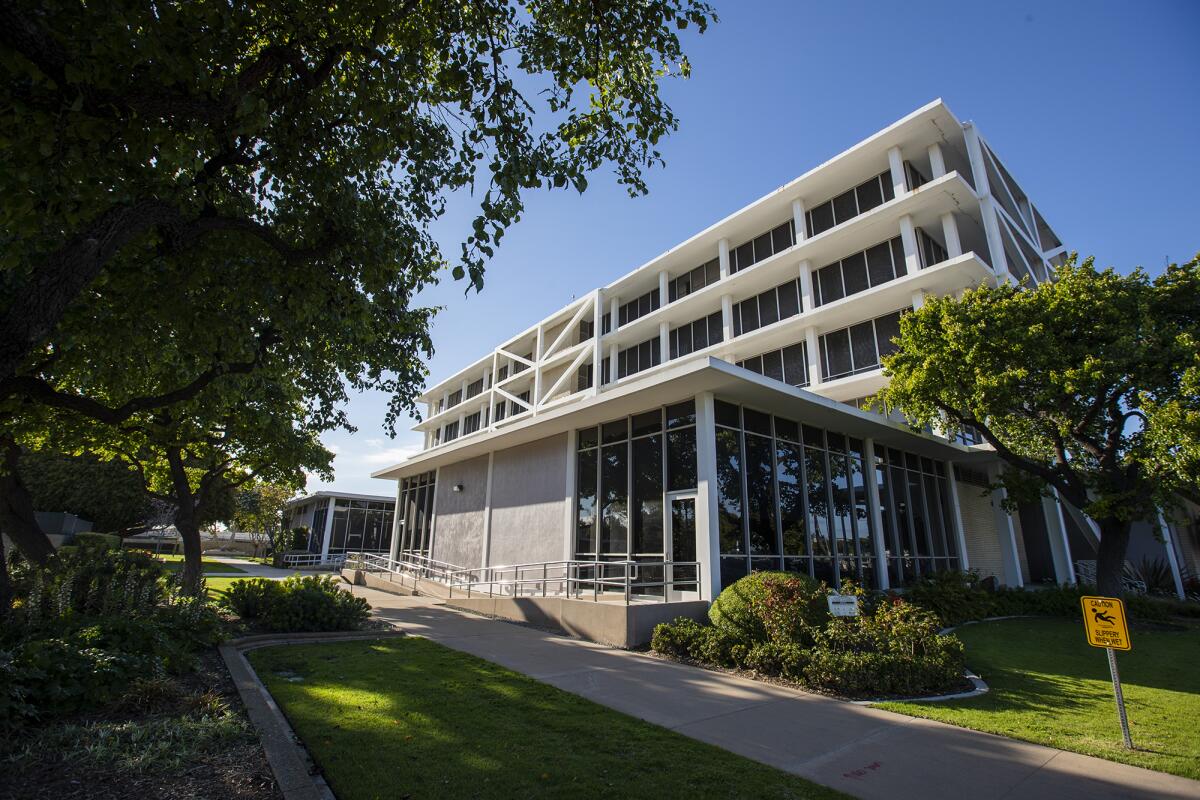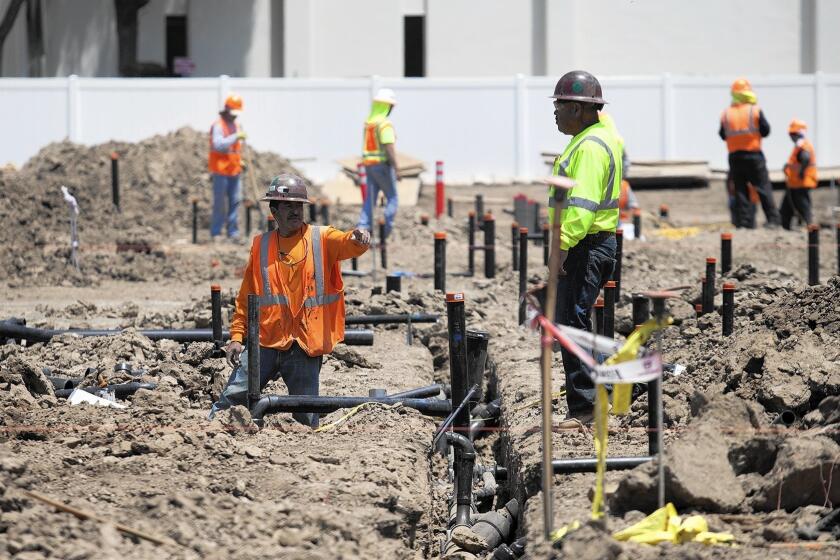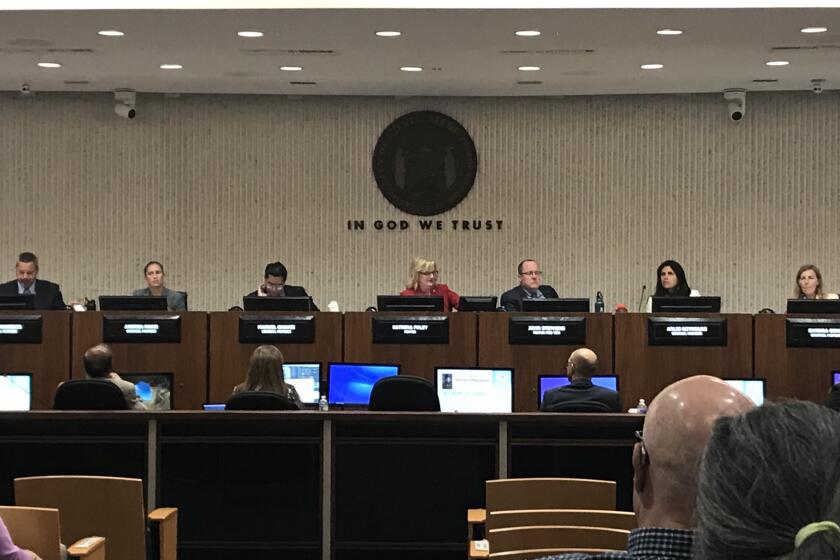Costa Mesa weighing growth-control initiative against future housing needs

- Share via
As Costa Mesa moves toward finalizing a housing element that will zone for an additional 11,760 residential units by 2029 to meet a state mandate, officials are considering the future of the citizen-backed Measure Y.
Passed by voters in 2016, the initiative requires large-scale zone changes or development projects exceeding certain impact thresholds be put to a vote by Costa Mesa residents. Proponents maintain Measure Y gives people a say in the growth of their city.
But in a community forum Tuesday, members of an ad hoc housing committee looked at Measure Y through a different lens, primarily as an impediment to meeting the state mandate ahead of a Feb. 11 deadline and as a potential block against more affordable housing.
“I know that there are some of you who bristle at the fact we’re even talking about Measure Y,” said Mayor Pro Tem Andrea Marr, who heads the City Council committee. “But I personally would be doing a disservice to my community if I didn’t try to study and understand all the policies that impact housing in this community right now.”
To fulfill a mandate that Costa Mesa accommodate 11,760 new residential units by 2029, leaders are surveying every possibility before an Oct. 15 deadline.
Marr said the city in December received an initial analysis from the California Department of Housing and Community Development of a draft housing element submitted in October.
The letter outlined several revisions Costa Mesa would have to make for its general plan to meet the state mandates, including addressing the complications of Measure Y.
“The measure is clearly a constraint on development and conflicts with meeting state requirements,” it read. “Based on this analysis, the [housing] element must include programs to address this constraint.”
Failure to comply with the mandate could incur harsh punishments, including the possible suspension of Costa Mesa’s ability to issue housing permits, fines and a loss of up to $800,000 in state housing funds currently used to operate the city’s permanent bridge shelter.
Catherine Blakespear, the mayor of Encinitas — which failed to comply with the state’s last mandated housing element (2013-2021), in part because voters had earlier passed an initiative like Measure Y — on Tuesday detailed the “nightmare” that followed.
The Costa Mesa City Council on Tuesday discussed a variety of possible solutions for accommodating the number of housing units the state says the city needs, such as an inclusionary housing ordinance, accessory dwelling units and co-living spaces.
Her city spent $2 million on unwinnable lawsuits and placed two ballot measures before voters in an attempt to meet housing mandate by consensus. Both failed. A judge ultimately suspended citizen-backed Proposition A so the housing element could move forward.
“You really don’t have any ground to stand on when you’re a city that doesn’t have an approved housing element, because it’s state law,” Blakespear said. “I do recommend getting right with the law.”
Jennifer Le, director of economic and development services, offered examples of how Measure Y prohibited large-scale developments and zoning amendments that might have benefited Costa Mesa.
She said the Newport Boulevard corridor is zoned under a specific plan that cannot be amended without triggering a Measure Y vote. Developers unwilling to hinge plans on ballot results have walked away from projects that might have improved the neighborhood, she said.
The Costa Mesa City Council adopted a resolution Thursday night opposing the methods the Southern California Assn. of Governments used to determine that the city needs 11,734 new housing units.
“[That] is a very good example of places where the community and staff agree could use some TLC,” Le said. “But the regulations we have today are really becoming a barrier.”
Nearly two dozen residents, developers and tradespeople weighed in on amending or possibly repealing Measure Y.
Christine Nolf, a member of the city’s Affordable Housing Coalition, described the housing need as dire and urged officials to consider the housing element exempt from Measure Y, based on ballot language clarifying it does not apply to “affordable housing proposals required by state or federal law.”
Others shared their frustration with rising rental costs making it difficult to live independently. But Measure Y supporters held their ground, suggesting the city examine redeveloping existing structures instead of planning for new ones.
“Measure Y, the people’s initiative, is a law of this city,” said Mary Spadoni, describing the multicity initiative Our Neighborhood Voices, which challenges state housing mandates. “Get involved, push back — this is our city, not a puzzle piece for Sacramento to play with.”
The ad hoc committee is expected to make a recommendation on Measure Y to the Costa Mesa City Council before the housing element is finalized in February.
All the latest on Orange County from Orange County.
Get our free TimesOC newsletter.
You may occasionally receive promotional content from the Daily Pilot.







